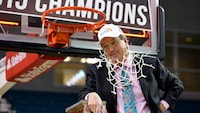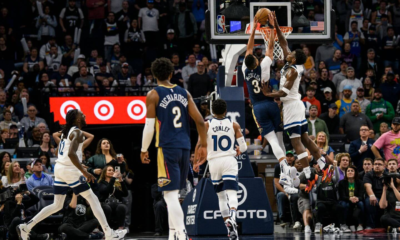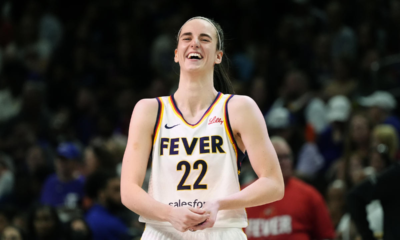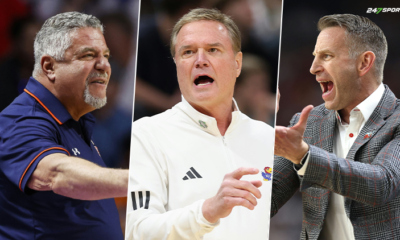Sports
Why Cliff Ellis, at age 78, finally retired from college basketball – The Washington Post

The winningest active coach in men’s college basketball retired Wednesday with little fanfare.
On the day after his 78th birthday, after more than 45 years as a Division I head coach, Cliff Ellis said he had had enough.
“I don’t feel as if I’m a coach anymore,” he said the day before he stepped down during his 17th season at Coastal Carolina. “I feel like I’m a general manager. I need a draft board in my office.”
Ellis is not, by any stretch, the first man driven away by the new world in which college coaches now live. He joins contemporaries such as Mike Krzyzewski, Jim Boeheim, Roy Williams, John Beilein and Jay Wright in voluntarily stepping away. Mike Brey, who left Notre Dame last season, may have spoken for all of them when he said, “The only way to describe what’s going on is exhausting.”
Ellis’s numbers are borderline elite. He coached four schools — South Alabama, Clemson, Auburn and Coastal Carolina — to the NCAA tournament. He won 831 games, and that doesn’t include the 78 he won as a junior college coach. Add those, and he won 909 games — seven more than Bob Knight.
No one — including Ellis — would claim he was a better coach than Knight. But while many people had mixed emotions about Knight the human being, you would be hard-pressed to find someone with anything bad to say about Ellis.
“Cliff isn’t a good person; he’s a great person,” said Krzyzewski, who competed against Ellis for 10 seasons while he was at Clemson. “He’s a throwback. He loved the sport and he loved the kids he coached, regardless of what level he was coaching. The sport will be less without him.”
Ellis didn’t intend to be a coach. He started out to be a musician — and was a successful one after graduating from Florida State. He was part of the Villagers, a rock/country group that recorded several successful albums. But he loved basketball and became a high school coach even while the Villagers were still recording.
“Once I got started in coaching, I couldn’t give it up,” he said several years ago. “I loved being in the gym, and I loved competing.” He smiled. “Of course I always loved winning, too.”
He kept winning his way up the ladder. Clemson won the ACC regular season title for the first — and only — time in 1990. During that season, Ellis was asked whether he thought the ACC was having a down year. “The only reason anyone thinks the ACC is having a down season is because Clemson’s in first place,” he said. “I guarantee you if Duke or North Carolina were in first place the question would never come up. The ACC’s not down at all.”
As it turned out, four ACC teams — including Clemson — reached the Sweet 16 that year and two (Duke and Georgia Tech) reached the Final Four. Clemson lost to top-seeded Connecticut in the round of 16 on a last-second shot by Tate George after he caught a length-of-the-court pass.
“I really believe and will always believe if we’d had video replay back then, the shot wouldn’t have counted,” Ellis told me decades later, still shaking his head. “I’m not saying the refs did anything wrong. They just didn’t have the tools available that they’d have today.”
Ellis went from Clemson to Auburn, where his 1999 team was ranked as high as No. 2, went 29-4 and again reached the Sweet 16. Four years later, he had another Sweet 16 team, but when the Tigers went 14-14 a year later, he was fired. He was nearing 60 and had made plenty of money. So he retired.
Three years later, he un-retired.
Coastal Carolina was looking for a coach with experience and approached Ellis, who wasn’t sure whether he wanted to go back to the grind. He called several of his contemporaries and asked what they thought. “Krzyzewski finally said to me: ‘Do you still like being in the gym? Do you still like running practice?’ ” Ellis remembered. “I told him I did, but maybe I’d gotten spoiled being at Clemson and Auburn. He said, ‘Cliff, coaching is coaching.’ He was right.”
Former Maryland coach Gary Williams remembers Ellis being “a voice of reason in a room filled with crazy people” at the ACC coaches meetings in the 1990s. “It seemed like everything was a fight,” Williams said. “And then Cliff would say, ‘Listen, fellas,’ and everyone would actually listen. He was that respected.”
When Williams retired at Maryland in 2011, one of his first calls was from Ellis. “He said: ‘You can’t retire. You’re too young,’ ” Williams said. “I understood what he was saying, and I knew there would be things I’d miss — and there have been. But he’ll find out that he can be okay without it. It just might take a little while.”
Ellis’s closest friend in coaching was probably another ex-Maryland coach, Lefty Driesell. He spent many years pushing Driesell’s candidacy for the Hall of Fame, and when Driesell finally got in (in 2018), he said, “Now I can retire.”
Only he didn’t. “I still have one goal left,” he said then. “I want to retire with more wins than Lefty. That way I can give him a hard time about it until we die.”
Driesell won 786 games. Ellis went past that number several years ago. Coastal Carolina became the fourth school he took to the NCAA tournament, making him the 10th coach to achieve that feat. Age didn’t drive him into retirement — the transfer portal and NIL did.
“It’s just stopped being fun,” he said. “I love to coach, but I don’t feel like I’m a coach anymore. It’s just time.”
“I think the thing Cliff enjoyed the most about coaching was his relationship with the players,” Krzyzewski said. “He didn’t do it for the money or for the glory or to be a celebrity. He loved to coach. He was successful at every possible level of coaching — from high school to junior college to the highest levels of the college game. And he never changed throughout all those years.”
As recently as this past summer, Ellis organized a retreat for old ACC coaches at his house in Myrtle Beach that included Krzyzewski, Williams, Les Robinson and Bobby Cremins. Most of the entertainment for the weekend was provided by the former lead singer.
“I hate to admit it,” Krzyzewski said with a laugh, “but he’s still really good.”
Cliff Ellis has always been really good — as a coach, as a singer but, most of all, as a person.








